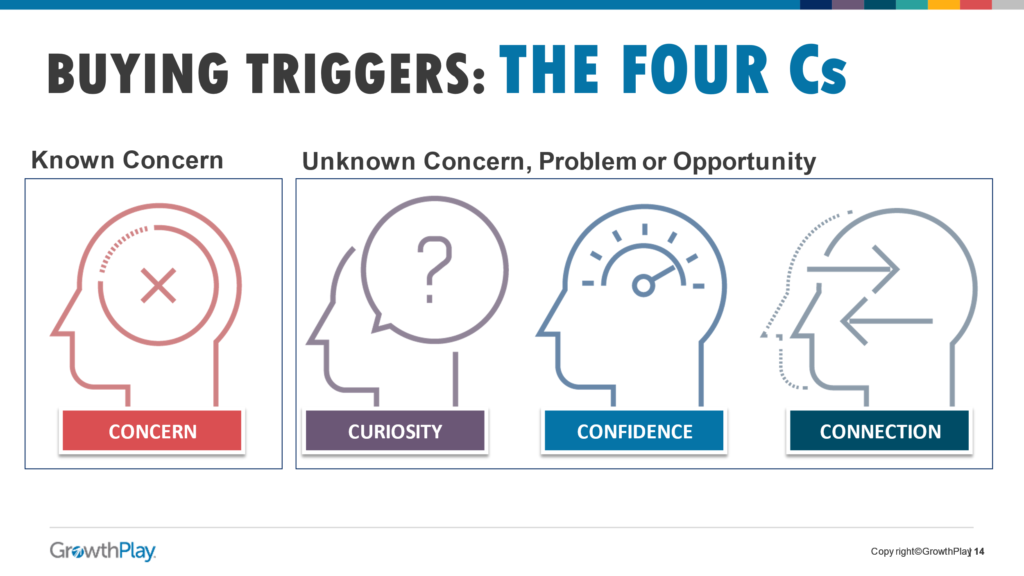Notice how a question creates a response? That’s because curiosity often plays a role in creating engagement. It’s a powerful emotional-based tool that can be leveraged in a sales process. While most lawyers often wait for opportunity to come to them, strategic sellers are focused on creating buyer triggers by communicating in ways that incorporate curiosity, confidence-testing and connection designed to create an emotional response.
Buying decisions, from purchasing a home or hiring a lawyer, are based on both emotional and rational considerations. Read on to learn what these buying triggers are and how to put them into practice (see what I did there!).
There are Four Cs tied to buying triggers. Often, attorneys focus on the first C—a (known) concern— because it is the most prevalent and easiest to address because it comes directly to them from an existing or prospective client. An example of a known concern is when an existing client comments on another firm’s increasing rates and says they want to explore other services the lawyer’s firm provides. Or a potential client decides to sell their company and needs an attorney to handle the deal. Other examples of a known concern might include receiving an RFP from a client or getting a referral email from a contact in the lawyer’s network.
In these situations, specific concerns are identified, putting the lawyer on notice that there is an opportunity to engage in sales conversations. While a known concern is an easy-to-identify sales trigger, it is also essentially out of the lawyer’s control and the opportunities that arise may or may not be a good fit for that lawyer or their firm. Therefore, we coach lawyers to focus on three other Cs that are within their control to create the buying opportunities they want and with whom.

Curiosity. Just as the title of this post invited curiosity, the first C that is within a lawyer’s control uses curiosity that capitalizes on an emotional response often triggered by thought-provoking questions. Consider strategic questions like:
- Have you heard about this new development?
- Have you seen the new report that suggests…?
- Are you aware of…?
- Would you like someone to review your acquisition documents from an employment law perspective?
- What do you need to get done before now and the end of the year?
Confidence. FOMO (fear of missing out) is a natural human emotion—one that can be used to trigger potential buying mode. When testing the client’s confidence, an attorney can bolster their standing as an “in-the-know” lawyer and alert someone that they may be missing out or that there’s something to be gained by taking advantage of that information. Here are some examples of how to trigger FOMO:
- What would you need to get ahead?
- Are you prepared for the changes in law that take effect next year?
- How prepared are you to address the changing economy?
- How confident are you that you’re ready to execute on that strategy?
- Do you have the support you need to complete next quarter’s transactions?
- We’ve made significant investments in project management so we can serve our clients more efficiently. Are your other service providers using this tool?
Connection. The foundation of all successful business development in rooted in authentic relationship building. The most successful rainmakers have invested the time learning about the variety of needs and interests of their most important stakeholders. Because they have earned that relationship capital, they have established a strong connection that can be leveraged in a buying trigger. We often refer to this as Dreaming Out Loud or “dreaming big” with key contacts. It is a communication technique that acknowledges the relationship, makes a request, and asks for advice. Here are a few examples:
- “I value our relationship and enjoy working with you. I would love to figure out how we could collaborate on more projects. How would you suggest we approach that possibility?”
- “Your business is growing and I can see the impact this has on you and your team. I would love to be able to take more off your plate and support you. What do you need to off-load?”
- “I really value your opinion. I’m at a point in my career where I’d love to connect with more outside counsel but have struggled in traditional networking settings. Do you have any suggestions on what I could be doing better?”
I must emphasize that tapping into Connection works only when the lawyer has earned the right to do so. If they are not ready to Dream Out Loud, they might look to the other two Cs we shared.
Which C is the ‘right’ C?
As a reminder, buying decisions are made both emotionally and rationally. Each of the four Cs—concern, curiosity, confidence, and connection—are different tools in the sales toolbox. Although concern is the easiest to identify and react to, don’t forget about the other three Cs that are totally within a lawyer’s control. Choose the buying trigger that feels right given the context of the situation, the strength of the relationship with the client or potential client, and what will be most important to them. As with all sales conversations, the 4Cs aren’t a one-and-done action but part of an ongoing relationship that empowers lawyers to elevate sales from a transaction to an act of service.
